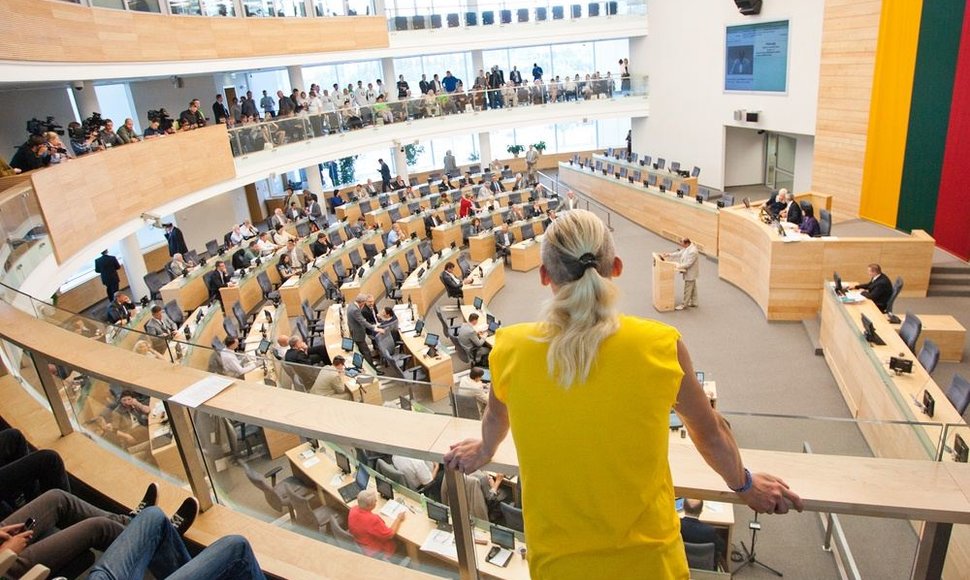History will remember the current Seimas for its overnight tax reform, for deconstructing one company created to build a nuclear power plant and setting up a new one, for breaking up a party of showmen, and for violating traffic rules, laws, and even parliamentary pledge more times than any parliament before.
That the composition of the parliament would be colourful became obvious even before the 2008 elections, when TV show host and producer Arūnas Valinskas announced he would be running for parliament. He brought together a group of his show-biz colleagues, including his wife Inga Valinskienė, and formed the National Revival Party (TPP), winning a decent share of seats.
The political upstarts negotiated for themselves the post of the parliamentary speaker and ministers of environment and culture. Only after several votes did Valinskas himself took the speaker's credentials.
Unfortunately, the show would not go on for long – the speaker was soon overthrown (Irena Degutienė of the Conservative Party succeeded Valinskas in the post), while internal wrangles split the TPP parliamentary group. Part of its MPs joined the Christian Party, while Valinskas and his followers merged with the Liberal and Centre Union last year.
Nocturnal tax reforms
As soon as the Parliament got into gear, it became the target of expert criticism and popular damnation – all because of the so-called overnight tax reform. Over the last days – and nights – of 2008, the MPs adopted over 60 legal amendments: they increased VAT and profit taxes, excise on petrol, cigarettes, and alcohol, revoked many VAT exemptions, even though it also lowered income tax for private individuals.
Chaos reigned, according to analysts, in reforming the social security system – cutting maternity leave and postponing retirement age was a prolonged process. Experts praised, however, changes in sick leave procedures and pay, benefits for the unemployed.
Less than one year into the term, September 2009, the Seimas agreed to dismantle LEO LT, the company created to build a new nuclear power plant by the previous Social Democrats-led government and NDX Energija, company owned by Vilniaus Prekyba group. Parliament concluded the tenure by giving its blessing to another nuclear project, Visaginas Nuclear Power Plant, which should include Latvia and Estonia as well as Lithuania and a strategic investor from Japan, Hitachi.
Lying trumps bribing
Incumbent members have had exceptionally much trouble with law enforcement, even though the only MP who lost his mandate committed arguably the least serious offense.
Linas Karalius, who got into Parliament with the National Revival Party and later ran to the Christians, ended two year into the term, after an impeachment procedure. What cost him his office was a holiday trip to Thailand during parliamentary session in July 2010. His colleague, Aleksandras Sacharukas, tried to cover up for absent Karalius, yet he retained his post, even though the Constitutional Court ruled that both MPs gravely violated the Constitution and MP's oath.
Colleagues managed to protect Evaldas Lemantauskas of the Law and Order Party from getting sacked. In April last year, Prosecutor General Darius Valys addressed the Parliament with a request to revoke Lemantauskas' legal immunity. Prosecutors were investigating a case were the MP was suspected in an attempt to bribe Vidas Urbonavičius, member of the Vilnius City Council. While serving as vice mayor of Vilnius, Lemantauskas had allegedly tried to buy off the opposition with half a million litas.
68 MPs proposed a motion to grant Valys' request, but that was not enough, as 71 votes were needed to revoke Lemantauskas' immunity from prosecution. The court was forced to suspend a criminal case brought against him.
“Parliament often becomes a safe haven for people suspected of criminal activities,” Henrikas Mickevičius, head of the Human Rights Monitoring Institute, commented on the vote.
Fast and furious
Over the past few years, prosecutors have made more requests to revoke MPs' legal immunity than ever before – 14 times in total. The most common ground – speeding and reckless driving, even though there have also been suspicions of involvement in corruption networks or dirty financial dealings. One case involved simple hooliganism.
Soon after the elections, MPs agreed to allow prosecute leaders of the Labour Party, Victor Uspaskich and Vytautas Gapšys, suspected of double accounting. Another case – of inappropriate behaviour in public – involved MP Rokas Žilinskas, who was elected to Parliament with the National Revival Party of showmen (Žilinskas was previously a TV news anchor), but have since joined the Conservatives.
Vincas Babilius, also a fellow partisan of Mr Valinskas, had his immunity taken away twice for speeding and traffic accidents, while unruly driving also landed conservative Arvydas Vidžiūnas and liberal Algis Kašėta in trouble.
In late May, the Seimas revoked legal immunity of Vitas Matuzas, conservative MP and vice-chairman of parliamentary Budget and Finance Committee. He is suspected of fraud, undue influence, and document forgery in organizing public procurement competitions and securing state and EU support.













